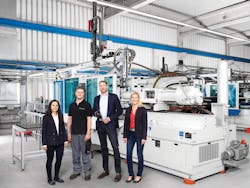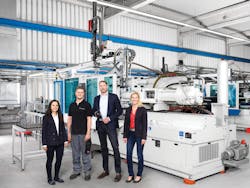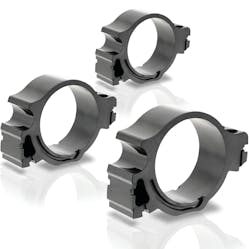KraussMaffei software takes on thermosets
KraussMaffei has refined its machine control software to improve the consistency of injection molded thermoset products and expand the range of thermoset materials with which it works.
“In general, processing thermosets is more sophisticated due to the chemical bonding of the material at a certain temperature, and operators need to spend more time keeping the machine running compared to thermoplastic applications,” Krauss-Maffei President Paul Caprio said.
“Even if the barrel of the injection unit is cooled, the chemical bonding starts at a certain temperature and the viscosity of the material begins to change right away. The temperature in the barrel cannot be controlled 100 percent by the operator as it is influenced by different shear rates of the material or due to thermal impact [temperature change] coming from the environment. The result is changing viscosities and inconstant shot weights without APC Plus,” he said.
APC Plus software also helps molders get the sometimes difficult-to-start thermoset process running more quickly, the company said.
“When they need to stop the machine, even for a short amount of time, start-up times are sometimes very long as the operator has no option to determine the actual viscosity and compression of the material that is in the barrel, and adjust the machine accordingly,” Caprio said. “It’s sometimes a very long trial-and-error procedure to get a good shot after downtime. APC Plus is able to get good parts from the first shot after startup.”
APC Plus overcomes issues related to variations among different batches of raw materials.
“Having a consistent shot weight is more important for thermosets as they get their final strength by a certain compression of the material in the mold,” Caprio said. Also, thermoset resins have a low viscosity and overshooting can lead to mold damage, or to a long period of downtime to clean the mold. These are costly problems because thermoset scrap cannot be reused.
“We didn’t anticipate how to react to a changing viscosity and compression of the material that is based on a calculation in the compression phase of the material, rather we refer to the characteristics that we have analyzed and adjust the injection process,” he said. “Even if a customer has a very specific material, we’re always able to analyze that material and incorporate the characteristics for it into the machine.”
Based on changes in viscosity and compression of the material, APC Plus adjusts the machine’s switch-over point, which is when the process goes from filling the mold to applying backpressure within each shot. “That leads to a consistent shot weight for each part,” Caprio said.
KraussMaffei enhanced APC Plus because a long-time customer, Baumgarten Automotive Technics GmbH, Burbach, Germany, asked for help improving its thermoset molding process. Baumgarten has been using APC Plus to produce oil pump adjusting rings for a year.
“Due to a great success with APC Plus, Baumgarten is now running 25 machines 24/7 in a closed-loop control by APC Plus, and was able to reduce scrap by 50 percent,” Caprio said.
Bruce Adams, senior staff reporter
Contact: Krauss-Maffei Corp. Florence, Ky., 859-283-0200,


